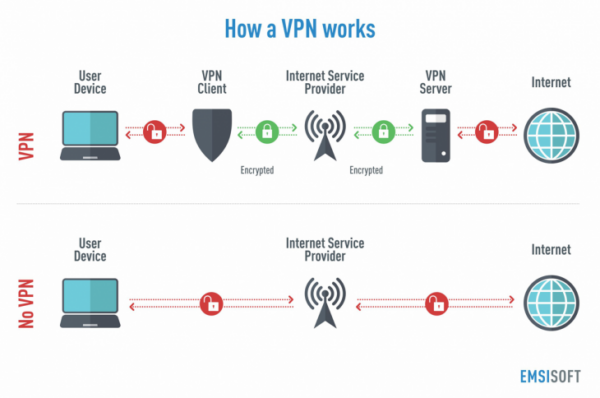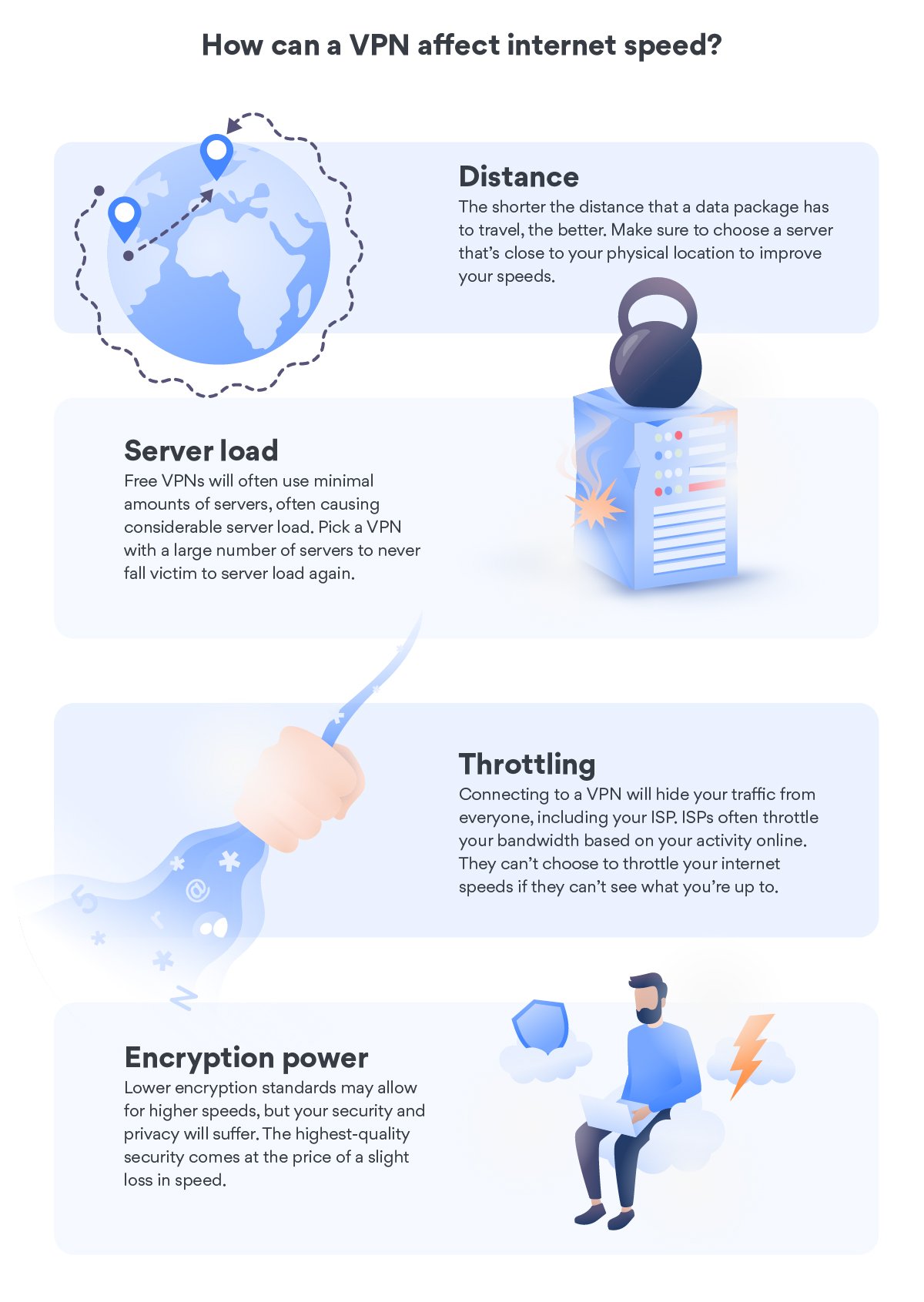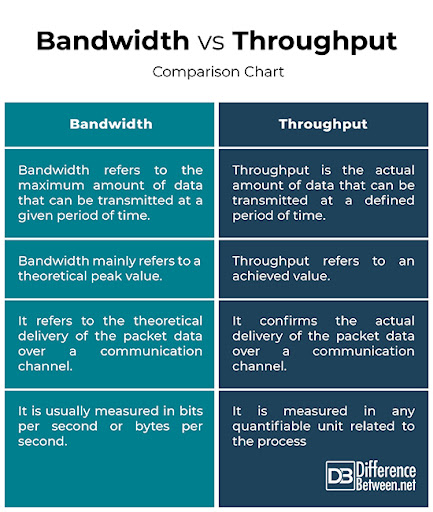Does VPN Slow Down Internet Speed? How To Prevent Speed Drops
Let's explore whether VPNs can slow down the internet
The internet is an invaluable resource. Everyone needs access to the internet for personal, professional, and educational purposes. But, of course, it goes without saying that when connected to an unsecured network, such as a local coffee shop, you risk hackers snooping into your private information or stealing your identity. You also can’t protect against viruses that might infect your laptop in the middle of the night while you’re sleeping.
So it’s understandable that users might want to find solutions to these problems — VPNs (Virtual Private Networks) offer an excellent way for people with an internet connection and a device with Wi-Fi capabilities to remain secure online. However, everyone wants fast internet speed with no lag time, so it can be frustrating to discover that any time you connect to the internet through a VPN service, there is usually some sort of hit on your speed—sometimes even significant enough that sites take longer than average if they load at all.

(Image Source: Security Boulevard)
VPNs are not, however, all free. Users have to subscribe to a service in order to gain access. These services have become very popular in recent years because they allow users to access the internet anonymously and securely. Additionally, they also allow subscribers to gain access to blocked websites when at home or when travelling abroad.
The good news is that not all VPN’s will slow down your regular web surfing speeds. This is because a VPN uses the same data path as your ISP, but this data path goes through the VPN provider’s servers instead of directly to your computer or mobile device. This means that you are sending your data out over the internet, but it is being encrypted, so no one can read it if they are listening in on the data stream between you and your VPN provider’s servers.
VPNs work with any device that has a Wi-Fi connection. This includes smartphones, tablets, laptops, and computers. And VPNs aren’t just for your computer or mobile device — they have recently become very popular in the world of smart TVs and gaming consoles as well. So how exactly does a VPN slow down Internet speeds?
How Does A VPN Slow Down Internet Speed?
There are several ways to slow down your internet speed using a VPN. For example, using available bandwidth for streaming or writing files can slow down download speeds because the data will not be able to transfer as quickly as it would without using the VPN.
Encryption Methods For Encrypting Data
If you are encrypting sensitive data, such as personal data, you should ensure that the person who receives it has access to the same key used by you. This means that no one else can access any documents, pictures or other content sent over a system, even if they have the correct password or certificate. If someone does manage to access this information, they won’t be able to decipher it without having the key.
The first type of encryption used in a VPN is the “asymmetric key.” This method works by using one secret key to decrypt a file and another to encrypt it. However, this method is not ideal because it involves a lot of processing. Other methods are more efficient, such as those using public-private keys or those using hashing functions for encryption and decryption processes. In these methods, both the sender and receiver have access to whatever they need since only one method is available for encrypting data. This means that two keys – an exclusive public key and a private key – are used to encrypt and decrypt data.

(Image Source: Nord VPN)
Public-Key Encryption
Public-key encryption is a method that uses public and private keys and is the most secure of the different types of encryption methods. This type of encryption requires two pairs of keys – one to encrypt or decrypt data and another to confirm this process. The first, the “public” key, is shared by everyone who wants to exchange information securely so that both parties can encrypt information using it before sending it off via an insecure network such as the internet. This means that the public key holds the data itself while the private key is used to encrypt it.
VPNs Slow Down Internet Speeds for Multiple Reasons
Using a VPN will slow down your web browsing speed and cause data usage to increase because of all of the extra steps that need to be taken inside of your computer or mobile device to get access to the internet.
When using a VPN, your computer/mobile device must first connect to the VPN server. This is where your data is sent, and then it is encrypted and sent out over the internet to the appropriate servers.
Along with that, most VPN providers provide their own DNS services that will be used to redirect users’ traffic through their own servers before they reach your ISP’s servers. This means that no matter which VPN service you use, all of your data will be routed through their server — and they can set limits on how much bandwidth they allow each user to use on their service.
How To Prevent VPN Speed Drop?
There are two different ways that you can prevent your VPN speed drop. The first way is to use the VPN service actively or to always use it. Take advantage of all of the added security and privacy features that the VPN provides by signing up for one. Then, after you have completed all of your desired tasks, you should disconnect your VPN by uninstalling the application or turning the service off. This will help ensure that you do not waste bandwidth when there is no need to be sending data through a VPN’sVPN’s servers.

(Image Source: Difference Between)
The second way is to change how much bandwidth you use when using a VPN. This might prove difficult for those who want to stream content or play online games as the connection will probably be too slow. But for those who want to do basic browsing and possibly even torrenting, you can easily lower your VPN bandwidth. This will help ensure that you do not use too much bandwidth when using a VPN so that it does not have a negative effect on your web speed.
Adjusting Your Bandwidth on Your VPN App
Every type of VPN has different instructions for how you can lower your bandwidth. However, here are some general steps that will apply to just about any VPN app:
Open up the “Options” menu of your chosen VPN app if it has one listed.
Select the “Bandwidth mode” drop-down menu. This will allow you to change your bandwidth settings for different time periods.
If you don’t see the “Bandwidth mode” menu, look for “Connection speed control” instead. If this option is not available, just select the lowest setting, you are comfortable with to ensure that you are not wasting money on the bandwidth that is not being used.
Once you have picked your preferred speed, make sure to click on the “Save Changes” button at the bottom of the page. This will be necessary in order to save your new settings for later use.
How To Protect VPN Speed
Even if you are not concerned about the speed of your normal web browsing, you should still be worried about how much data is being consumed by your VPN. It is possible to choose a VPN that will cost the same amount of money, but it will also use less bandwidth than another service.
You might also want to take advantage of the bandwidth usage features offered by some VPNs so that you can lower how much data they are consuming on your computer or mobile device. This is especially true when using “free” VPNs, but even most paid services offer this feature.
The bandwidth usage feature of a VPN saves your bandwidth for when you need it. If you don’t have any urgent tasks that you would like to do at the moment, the VPN will automatically lower your bandwidth so that it doesn’t use too much while you browse the web.